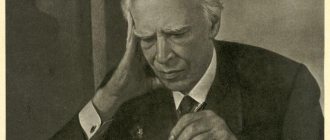Anton Pavlovich Chekhov - Russian writer (1860-1904) . For the first time (at least on the Internet there is no other, earlier date) Chekhov expressed this idea on April 8, 1899 in a letter to the publisher Suvorin: “I think that if I lived another 40 years and during all these forty years read, read and read and learn to write talentedly, that is, briefly
, then in 40 years I would fire a cannon so big at all of you that the heavens would tremble.”
A few days later, on April 11, in a letter to his older brother Alexander, Chekhov formalized the idea of conciseness of what was written in the phrase that has been known since then: “My advice: in the play, try to be original and, if possible, smart, but don’t be afraid to seem stupid; What is needed is freethinking, and only that freethinker is one who is not afraid to write nonsense. Don't lick, don't polish, but be clumsy and impudent. Brevity is the soul of wit . Remember, by the way, that love explanations, betrayals of wives and husbands, widows, orphans and all sorts of other tears have long been described. The plot must be new, but the plot may be absent"
A. P. Chekhov
Writer, playwright. Born in Taganrog, in the family of a shopkeeper. He graduated from high school and the medical faculty of Moscow University. The first story, humorous, was published in the magazine “Dragonfly” on March 9, 1880. In 1884, after graduating from the university, he worked as a doctor in Zvenigorod. From 1884 to 1888 he wrote more than 350 various works. He has been published in the magazines “Oskolki”, “Russian Thought”, “Severny Vestnik”, the newspapers “Russian Vedomosti”, “Petersburgskaya Gazeta” and many others. His most famous stories are “Man in a Case”, “Ionych”, “Gooseberry”, “Kashtanka”, “Darling”, “Lady with a Dog”, stories “Ward No. 6”, “Steppe”, “Duel”, plays “Uncle Vanya", "Three Sisters", "The Cherry Orchard".
Too many details
Trying to fully reveal the idea of his speech or literary work, the author often adds a lot of details - and not always necessary. These insignificant little things work to the detriment - they scatter the attention of the interlocutor, preventing him from focusing on the main idea. As a result, his head turns out to be filled with all sorts of nonsense: statistical data, dates and numbers, biographies of people who were indirectly related to the topic, the size of the feet and eye color of the main character, weather conditions and the composition of the soil of the place of events...
Stop, it's time to stop! Even I got a headache from such a long and unnecessary sentence. So don’t take my example and don’t delve into where you don’t need to go. Details are important only in the design of mechanisms - in the composition of the story they often do not play any role at all.
Aphorisms of Anton Pavlovich Chekhov
- A smart person loves to learn, but a fool loves to teach!
- If you can't write, don't write.
- Money, like vodka, makes a person an eccentric
- Wonderful day today. Either go drink tea or hang yourself
- A person is what he believes in
- Even in human happiness there is something sad
- Only fools and charlatans know everything and understand everything
- The cheapness of Russian goods is a certificate of their worthlessness
- What is unclear is a miracle
- Shakespeare is not the main thing, but the notes to it
- He who cannot take with affection will not take with severity.
Chekhov's phrase is the essence of dramaturgy
Having written to his brother the phrase “Brevity is the sister of talent,” Chekhov talked about drama. And indeed, here, more than anywhere else, it is important to hold the viewer’s attention. But it’s quite difficult to do this with a long monologue. The great writer himself possessed this talent to the highest degree. He is not only a great playwright, but also a master of the short story. His works are succinct and accurate, despite their short duration. A.P. Chekhov became famous for his skill throughout the centuries. That’s why so many people, even those far from regular reading, know the phrase “Brevity is the sister of talent,” who said it, and that it means the ability to clearly express one’s thoughts.
And it is not at all surprising that another brilliant playwright, William Shakespeare, expressed a similar idea long before Chekhov; he called brevity the soul of the mind.
Suvorin A. S.
Publicist, theater critic, publisher. Born in 1834 in the village of Korshevo, Voronezh province, into the family of a raznchinets. My grandfather was a serf, my father rose to the rank of captain. He studied at the Voronezh Cadet Corps, and in 1853 he graduated from special classes of the Noble Regiment. Due to poverty, he did not enter the university; he worked as a history and geography teacher. On February 15, 1858, he made his debut in the press with the poem “Prisoner,” published in the magazine “Fashion.” Since July 1861, he collaborated with the Moscow newspaper “Russian Speech”, published in the magazines “Sovremennik”, “Otechestvennye Zapiski”, “Russian Invalid”, “Bulletin of Europe”. From 1876 until the end of his life, he was the publisher and editor of the newspaper “Novoye Vremya.” Chekhov published a lot in it in the 90s. Suvorin was the first in Russia to organize stationary sales of periodicals. Shops and kiosks of “A.S. Suvorin’s Contract” operated in large cities and at railway stations. In 1879, Suvorin founded the so-called “Cheap Library,” which published works that were affordable for the poor. In 1880 he co-founded the magazine “Historical Bulletin” and was its publisher until the end of his life. Died 1912
Relevance of the expression
Of course, brevity of speech and the ability to clearly express the essence have always been extolled. Legends tell of the Spartans, who were famous for centuries for their ability to express thoughts concisely like no other. They say that the father of Alexander the Great, Philip II, also a famous conqueror, approaching the walls of Sparta, began to show off, calling on the defenders of the city to open the gates. His speech was replete with the conjunction “if.” He said that if the townspeople did not obey him, if he was forced to take the city by force, and if he made a passage for the troops with a ram, and so on... He threatened, admiring himself. The Spartans gave him an answer that contained only one word, “If.”
Brevity is the sister of talent, or the greats are about laconic speech
- And the most brilliant speech becomes boring if it is drawn out (Blaise Pascal)
- Brevity is the soul of wit (William Shakespeare)
- Where words are few, they carry weight (William Shakespeare)
- He is a true sage who knows how to say many things briefly and clearly (Aristophanes)
- Talking a lot and saying a lot are not the same thing (Sophocles)
- True eloquence is the ability to say everything you need to say, but no more (François La Rochefoucauld)
- One word is enough - everything else is chatter (Jerzy Lec)
- The power of speech lies in the ability to express a lot in a few words (Plutarch)
Synonyms have no place in this phrase
A.P. Chekhov could not help but know this beautiful legend. When pronouncing his famous phrase “Brevity is the sister of talent,” the author had in mind exactly the same, like the Spartans, brilliant ability to clearly and clearly express the very essence of the issue.
The word “brevity” itself has a number of synonyms: “laconicism”, “laconicism”, “conciseness”, “lapidarity” and several more, among which there is even “shortness”. The last word rather expresses disdain for the manner of speaking briefly. The synonyms “laconicism” and “lapidarity” are most suitable, but you cannot insert them into the phrase under study, because its beauty and accuracy are lost.
An example of brevity, which is the sister of talent
“You must be very careful! How can you not understand? You might run into a fool like me who could ruin your vacation. She will get attached. He will bore you, call you, tug at you... And you need to rest. But she won't give it to you. She doesn’t understand that it’s all over! That you no longer need her and can go somewhere calmly... She won’t understand this. She will not be able to come to terms with this and will write to you, come to you... She will have no idea that it is over. Well, it's over! Everything ends. It was all over even faster than the vacation. But she won’t catch this moment and won’t understand this moment. She will not think well in this state... And you will lie. And she will believe. And you'll get tired of it. You say: “After all, where is her self-esteem?” Well, before it gets to her pride, let it get to you: With someone like me, be very careful! I see you are already afraid. You have already met such people... Until love arose in me, and responsibility in you, Let's stay in our places - so that all future meetings will be like this one. We need to be taught not to war, but to peace! That’s where we have achieved little so far” (M. Zhvanetsky)
Where did the expression come from?
It’s the same with the saying “Brevity is the sister of talent.” Who said this? But perhaps there are more people who know the answer, because the author of the phrase lived in the 20th century, and even in Soviet schools it was mandatory to know it. This is Anton Pavlovich Chekhov, whose years of life are 1860–1904. The phrase is “winged”, it is used often. It was taken from a letter to his older brother Alexander Chekhov, also a writer and playwright. This is a professional conversation between two people who create plays. It is in relation to dramaturgy that the phrase “brevity is the sister of talent” is appropriate. Who said that it can be used as a guide when describing feelings, nature, or a portrait of a hero? But what about “War and Peace” by Leo Tolstoy?
Conciseness in work
We talked about brevity in speech, but it must be present in any work that a person does. And in clothes, and in paintings, and in buildings, and in television programs. When something lacks brevity, they usually say - it’s too clumsy and pompous, the author has clearly gone too far, he has no sense of proportion, he should add restraint. Brevity, laconism, simplicity are essential attributes of good taste and style. Look at the most famous works of human hands - the Eiffel Tower, the Egyptian pyramids, the Statue of Liberty. As they say - neither add nor subtract, nothing superfluous, nothing unnecessary. This is brevity at its best.
Indeed, brevity is the sister of talent, but is it always so? Indeed, this catchphrase is often used as a cover for lazy people who will get the job done if only they can, and explain their shortcomings with “brevity.” Brevity should also be in moderation - when removing everything unimportant, you need to learn to leave the important, and not cut off your finger along with the nail.
A true master of his craft will never be too lazy to redo his work, remove unnecessary things, and make more concise what is too long. Brevity is work that forces you to check every step and check the importance of every detail. And then, when only the most necessary remains, this is the ideal. This is the golden mean, combining the completeness of expression of an idea and simplicity, not burdened with excessive design.
If you find an error, please select a piece of text and press Ctrl+Enter
.
Every person knows a lot of sayings and proverbs. But often the speech is interspersed with quotes, the origin of which not everyone knows. An example of this could be a saying that probably everyone knows: “man is a wolf to man.” But few people know that it belongs to the Roman playwright of the 3rd century BC - Plautus.
Now let’s dilute it with some water
Many people notice in the texts, stories of their interlocutor, and even in themselves, one very interesting, but not very pleasant feature of the construction of this very text or narrative. It is often found in people who talk or write a lot due to their profession - these can be politicians, journalists, writers, TV presenters and representatives of other professions associated with frequent and varied communication. True, this feature does not play into the hands of everyone - sometimes listeners simply get tired of digesting this florid set of numerous words that do not carry deep meaning, or that carry it, but somehow sluggishly - they have to carefully and carefully select its tiny golden grains from this empty and the gray sand of verbiage, which, by the way, is what I’m doing now.
This feature is especially dangerous when a person has a rich vocabulary and knows how to speak or write beautifully. They listened and listened (read and read), opened their ears, patted their eyes, but did not understand anything.
This feature is called “water” - it was so named in memory of market and store traders who had the bad habit of diluting beer, milk, vodka and everything that could be diluted with water. The volume remains the same, but the content is much poorer. But you won’t be able to deceive the buyer (listener, reader) for long. Sooner or later the high water content will be revealed and the merchant will lose all his customers.
Well, we've dealt with the main enemies of brevity, but how can we learn to avoid them? How to properly build a line of conversation, presentation or story, so as not to confuse yourself and everyone else? Here are some basic rules:
1. Logic to help.
Those who cannot cope with their own words usually have the same mess in their heads. If a person does not know how to correctly express a thought, then there is a high probability that his thought is just as half-thought out and crude. A person with clear logical thinking knows how to sort everything out quickly and accurately (read “How to develop logical thinking”). This means that before you start, you need to think through the thought to the end, comb it, pinch off everything unnecessary and then bring it into the material world.
2. Strict composition.
Every well-thought-out text or speech always has a clear structure, following which the author does not deviate from the main idea. If you have the opportunity to think through in advance everything you want to say, think it over, outline your points, write a plan. Over time, you will learn to structure text in your head, quickly and without preparation.
3. Don't be afraid to cut!
This is advice for aspiring writers that applies to everyone. Of course, it’s a pity to destroy the fruits of your work - after all, you try. But don’t be afraid - learn to ruthlessly throw out and cross out everything that raises doubts and seems not the most important. It hurts, but it's necessary. By the way, in the original version this article was much longer than it is now.








